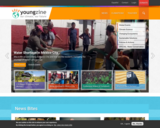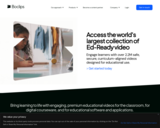
Series of videos on World History created by the team at Crash Course
- Subject:
- History
- Social Studies
- Material Type:
- Lesson
- Provider:
- Crashcourse
- Date Added:
- 05/21/2018

Series of videos on World History created by the team at Crash Course

World History Encyclopedia is a non-profit organization publishing the world's most-read history encyclopedia. Its mission is to engage people with cultural heritage and to improve history education worldwide.
The website offers thousands of free history articles, with a writing style aimed at students from middle school level and up. Articles are complemented by videos, timelines, 3D models, and interactive maps. The search function offers many filters, including the possibiliy to search for primary source texts.
Additionally, the organization published free teaching materials in its education section (https://www.worldhistory.org/edu/).

In which John Green talks to about the future of Crash Course, which in this case is the past, because we're going to teach some more World History. This year, things will be a little more topical. We'll be talking about big ideas like money and debt, disease, and war. And Vikings.

World Atlas offers interactive maps, clocks, flags and videos. Find interactive maps on all of the continents as well as the countries within. Explore to discover the flags and information about all countries. Watch videos and view pictures on the environment, world facts, travel, geography and did you know facts. Other topics to explore include history, science, economics, politics and society.

In which John Green teaches you about World War II, and some of the causes behind the war. In a lot of ways, WWII was about resources, and especially about food. The expansionist aggression of both Germany and Japan were in a lot of ways about resources. There were other reasons, to be sure, but the idea that the Axis needed more food can't be ignored.

In which John Green teaches you about World War II, aka The Great Patriotic War, aka The Big One. So how did this war happen? And what does it mean? We've all learned the facts about World War II many times over, thanks to repeated classroom coverage, the History channel, and your grandfather (or maybe great-grandfather) showing you that Nazi bayonet he used to keep in his sock drawer and telling you a bunch of age-inappropriate stories about his harrowing war experiences. So, why did the Axis powers think forceful expansion was a good idea? (they were hungry). So why did this thing shake out in favor of the Allies? HInt: it has to do with the fact that it was a world war. Germany and Japan made some pretty serious strategic errors, such as invading Russia and attacking the United States, and those errors meant that pretty much the whole world was against them. So, find out how this worldwide alliance came together to stop the Axis expansion. All this, plus Canada finally gets the respectful treatment it deserves. Oh, and a warning: there are a few graphic images in this episode. Sensitive viewers may want to use caution, especially around the 9:15 mark.

Forensic scientists are recovering buried clues of the lives of early colonists and discovering the stories written in their bones. Using graphics, photos, and online activities, this Webcomic unravels a mystery of historical and scientific importance about the life of a recently discovered 17th century human body along the James River on the Chesapeake Bay. Students can analyze artifacts and examine the skeleton for the tell-tale forensic clues that bring the deceased to life and establish the cause of death. Teacher resources are included. Note: Turn off pop-up blocker to successfully experience all site features.

This site offers news that is relevant for kids. Categories include:
World News
Science
Technology
Our Earth
History
Society/Arts

"YourCommonwealth would be an excellent supplement to classroom learning, especially for middle and high school students. With its focus on global current events and social issues, the site is a great resource for students to find out what kids like them consider important and reflect deeply on their own thoughts about the world's big ideas. Exercises and debates can be created around the opinions expressed on YourCommonwealth through text and video.
YourCommonwealth is an international site created by young people for young people who are interested in addressing global concerns such as injustice, poverty, and the environment. On the site, students from the 54 countries of The Commonwealth of Nations submit articles and videos to share their stories, experiences, and opinions. U.S. students can read about global social issues from a personal point of view –- and from someone around their age. Kids will have the opportunity to make up their own minds about pressing topics and, through discussion with parents and peers, learn how to express opinions.
It's organized by continent: Click on Africa and you'll get all the content relating to that area of the world. Young people from all over the world contribute articles and video to the site, which are then posted in a news-like format. By reading articles, kids can view opinions and timely issues from their global peers. Offsite, kids can get involved in Twitter chats and Facebook discussions on “the present, past and future of the planet.”" (Common Sense Media review)

boclips - the world’s video uniquely curated for education
You can access 60 days for free.
The 2 million short-form videos on boclips include the most highly rated YouTube EDU channels including TED, Crash Course and Sci Show. News stories from 1900 to the present day from trusted international providers like Bloomberg, Associated Press and Reuters. As well as immersive virtual reality experiences from Getty and PBS. We’ve even curated our video platform to your curriculum standards so you can easily find the most engaging videos - whatever topic you’re looking to bring to life.
For learning in class and at home, educators and students can stream bite-sized videos from globally recognized brands on-demand.
Courseware designers can find, license and download relevant videos to incorporate into school and university level digital resources.
It's fast.
It's safe.
It's personal.
You will need to register to use this resource.

Courte active numérique faite pour vos élèves et basée sur des capsules des films de l’ONF

À L’assaut est une aventure interactive qui vous permet de faire l’expérience de la vie dans les tranchées pendant la Première Guerre Mondiale.
Surtout pour la 6e - la 8e.

Now that we’ve talked a little bit about how sociology works, it’s time to start exploring some of the ideas of the discipline’s founders. First up: Émile Durkheim. We’ll explain the concept of social facts and how Durkheim framed sociology as a science. We’ll introduce the idea of common consciousness and how Durkheim believed it binds society together. We’ll also talk about Durkheim’s studies on suicide and how he applied his concepts to a specific social problem.